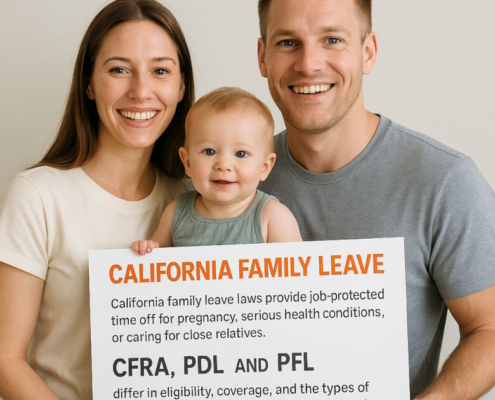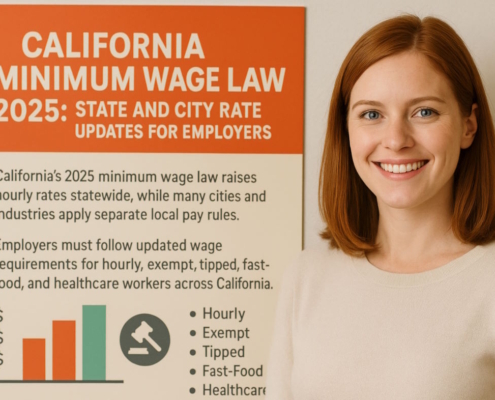What qualifies as wrongful termination in California?
When a company fires a worker for an unlawful reason, it’s considered wrongful termination. But that raises the issue: When is it against the law in California to terminate an employee?
Let’s take a look at what wrongful termination means in California law, how to recognize it, and what options employees have if they believe they have a case.
How Does California Define Wrongful Termination?
In California, wrongful termination means that a company fired an employee for an unlawful reason. This happens when a company fires an employee in violation of local, state, or federal law. Discrimination based on pregnancy, age, or disability is a common unlawful motive for wrongful termination. In certain cases, employees may have the right to sue their former employers for wrongful termination.
When an employer fires an employee for doing what they’re legally required to do or for exercising a legally protected right, and that right or duty is associated with a major public policy issue in the state, it’s considered wrongful termination in violation of public policy according to California labor law.
You might have a case against your ex-employer in California if you feel they fired you without just cause. But if you want to sue your employer for wrongful termination in California, you have to prove that they fired you because they broke the law or public policy. Put another way, an employee needs to prove that their manager violated the law in some manner when they fired them in order to have a wrongful termination case.
Since the majority of workers agree to be employed “at will,” meaning they are free to leave their jobs whenever they want and for whatever reason, this isn’t always an easy thing to do. Because of at-will employment, businesses can terminate workers at will so long as they don’t break any of the many laws protecting workers’ rights. Some of the most crucial of these labor rules are detailed here.
Does California have at-will employment?
California does follow the “at-will” employment theory. This means that in the absence of a written agreement, each party to the employment relationship is free to terminate it at any moment and for any cause.
When Is It Against the Law to Fire an Employee in California?
Contrary to popular belief, only a very limited number of circumstances can give rise to a claim of wrongful termination, legally speaking. However, such incidents do occur. A few examples of when it would be unlawful to fire an employee in California are as follows:
1. Contract Violation
A contract outlining the terms and conditions of an employee’s employment could serve as a safeguard against unfair dismissal. Typical provisions in such contracts include a definition of “cause” and a statement that the employee’s dismissal can only occur for good reason.
When this happens, the boss must have a good cause for firing the worker that fits the agreement’s definition. The employee has the right to sue for breach of contract if the stated cause for termination does not meet the criteria.
2. Violation of Covenant of Good Faith and Fair Dealing
As a general rule, when two parties enter into a legally binding agreement, they are essentially making an implied covenant of good faith and fair dealing commitment to each other, which ensures that they will not act in a way that unfairly disadvantages the other party.
One aspect of this is being truthful and not trying to trick the other person. Also, doing anything that would give one of them an unfair edge over the other in carrying out the agreement.
What this means in a work setting is that employers have a fundamental responsibility to their employees to provide them with the resources they need to do their jobs. Potential violations of the covenant of good faith and fair dealing include evasions, lies, lack of communication, deliberate inaction, and other kinds of obstruction or interference.
Under certain conditions, you may be able to file a wrongful termination claim in the state of California.
3. Retaliation for Sexual Harassment Claims
As a type of discrimination in the workplace, sexual harassment is against the law.
Under California law, your employer is required to actively prevent sexual harassment in the workplace. And if they don’t, you can legally hold them accountable for their failure to fulfill their duties.
Additionally, no employer has the right to fire an employee for speaking out against sexual harassment on the job. This is true whether the abuse is happening to you or to someone else.
Retaliation occurs when an individual faces negative consequences as a result of reporting or participating in an inquiry into sexual harassment. It is against the law in California.
You may have grounds for a lawsuit alleging unlawful termination if your dismissal is caused by your involvement in a sexual harassment investigation.
4. Retaliation For Using Medical or Family Leave
Nobody can terminate you for seeking or taking family medical leave.
There is a statute in California that safeguards workers against company retaliation when they use their sick leave for the diagnosis, treatment, or care of a preexisting medical condition. The same goes for preventive medical treatment for the worker or their family.
Imagine, for example, that you ask for paid sick leave and then get fired thirty days later. Under California law, this is probably a case of wrongful termination.
The onus then shifts to your employer to establish that your request or use of sick leave was not the sole justification for your termination.
Furthermore, you have the right to family or medical leave, and your employer cannot terminate you because you used it. The Family and Medical Leave Act (FMLA) and the California Family Rights Act (CFRA) both address this.
If you are employed by a company that is covered by one of these statutes, you have the right to take up to twelve weeks of leave for either your own serious health condition or the serious health condition of a member of your family.
Again, in California, the law will assume you were wrongfully terminated if you are fired while on Family and Medical Leave Act (FMLA) leave or within ninety days of returning from FMLA leave. In this case, it’s on your employer to show that it wasn’t the basis for your dismissal.
5. Retaliation Against Whistleblowers
Furthermore, no company can fire an employee for “whistleblowing” in any form. What this basically implies is that you can report them for breaking any number of laws, whether they be at the federal, state, or municipal level.
It would be an example of unjust termination if, after reporting a health or safety issue at work, your manager fired you.
6. Retaliation For Reporting Wage Law Violations
In a similar vein, the California Labor Code forbids employers from terminating employees for merely bringing attention to violations of wage and hour laws.
This covers situations where an employee claims or complains about underpaid wages, overtime compensation, and/or breaches of meal and rest break policies.
When employees file claims for underpaid wages with the Department of Industrial Relations, they are protected from retaliation The California Labor Code also protects workers when they exercise any rights, whether they be for themselves or other employees.
7. Discrimination Based on Pregnancy
It is also illegal to fire an employee only because they are pregnant.
No employer in California may dismiss an employee because she decided to get pregnant, or because of problems or requests relating to pregnancy-related medical difficulties, according to the Pregnancy Discrimination Act and the Fair Employment and Housing Act.
Another example of unlawful pregnancy discrimination would be denying or terminating an employee’s request for reasonable accommodations (such as leave) because of their pregnancy.
8. Violations Against a Certain Protected Class
Businesses in California with five or more employees are required to comply with civil rights legislation that forbids employment practices that discriminate against individuals on the basis of protected traits.
A group of people who share certain traits is known as a “protected class.” If your dismissal was due to the fact that you belong to a protected class, you may have grounds for a wrongful termination lawsuit.
California recognizes the following protected classes:
- Color
- Race
- Ancestry
- National origin
- Religion
- Sex
- Disability
- Age (if over 40)
- Marital status
- Genetic information
- Gender identity
- Sexual orientation
- Medical condition
- AIDS/HIV positive status
- Military or veteran status
- Political activities or affiliations
- Citizenship status
- Victims of domestic violence, assault or stalking
There may be more protected classes in some cities. For example, San Francisco has a law that makes it illegal for businesses to treat their employees differently because of their height or weight.
9. Breach of Public Policy
A California employer can face a wrongful termination lawsuit if they fire an employee who is just doing their job or fulfilling a public duty. Some examples of this include:
- Refusing to break the law
- Carrying out a legal duty
- Performing a legal privilege or right
- Reporting a possible breach of a law that affects the public
For instance, as serving on a jury is a legal requirement, it is unlawful to terminate an employee for requesting time off to do so. Refusing to commit a crime (like fraud) on behalf of your employer is also not legitimate grounds for firing.
The circumstances surrounding this breach should have the potential to affect the general public, rather than solely focusing on the worker’s and employer’s private interests.
10. Other Kinds of Discrimination and Retaliation
There are a variety of other, more nuanced scenarios in which, depending on the context, your dismissal may constitute discrimination or unlawful retaliation in violation of California labor laws. As an example, you could be a volunteer fireman, a victim of a specific crime, or a new mother seeking special lactation accommodations.
In addition to these specific regulations, the California Department of Industrial Relations also keeps a list of other laws that prohibit discrimination and retaliation.
How to Respond to an Unlawful Termination in California
When an employer fires an employee under one of these circumstances, the employee may have legal options, including suing the company.
You may be able to collect damages from your employer if a judge rules that your firing violates California law.
The employee may be able to collect compensatory damages in the event of a successful lawsuit. These damages might cover things like legal fees, lost earnings or benefits, and mental stress caused by the firing. When a company’s infringement has a particularly severe impact, courts may additionally award punitive damages.
Talk to a California employment attorney who can evaluate your case if you think your firing was illegal. After reviewing your case, a wrongful termination attorney can advise you on your legal alternatives for compensation and represent you in court.































